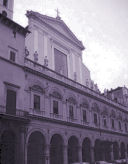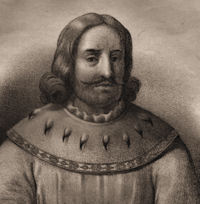Lent: March 2nd
Friday of the First Week of Lent
Other Commemorations: Bl. Charles the Good, Martyr (RM)
» Enjoy our Liturgical Seasons series of e-books!
"If your virtue goes no deeper than that of the scribes and Pharisees, you will never get into the kingdom of heaven (Matt. 5:20)." The need to make reparation is a vital, inescapable urge of a free person. His very nature cries out for order and peace. His reason tells him that where an order has been violated, the order must be repaired; and the higher the order, the greater must be the reparation. To be free at all, is to accept the responsibility for atonement. Sin is a violation of God's order. Sin demands reparation — the reparation of personal penance, personal prayer, personal charity to all. Part of our atonement to God is made by serving our fellow men. — Daily Missal of the Mystical Body

Today's station is at the Church of the Twelve Apostles. Traditionally, this is the place where the Romans choose their candidates for priesthood (Rite of Election). It was erected by Julius I (337-352) over the barracks of ancient Rome's firemen and entrusted since 1463 to the Conventual Franciscans. Originally dedicated to the Apostles St. James and St. Philip, it was rededicated to all the Apostles in the 16th century.
Meditation on the Gospel - Mark 8:34-9:1
When Jesus said "If any man would come after me...", he was well aware that in fulfilling his mission he would be brought to death on a cross; this is why he speaks clearly about his Passion (vv:31-32). The Christian life, lived as it should be lived, with all its demands, is also a cross which one has to carry, following Christ.
Jesus' words, which must have seemed extreme to his listeners, indicate the standard he requires his followers to live up to. He does not ask for short-lived enthusiasm or occasional dedication; he asks everyone to renounce himself, to take up his cross and follow him. For the goal he sets for men is eternal life. This whole Gospel passage has to do with man's eternal destiny. The present life should be evaluated in the light of this eternal life: life on earth is not definitive, but transitory and relative; it is a means to be used to achieve definitive life in heaven: "All that, which worries you for the moment, is of relative importance. What is of absolute importance is that you be happy, that you be saved" (J. Escriva, The Way, 297).
"There is a kind of fear around, a fear of the Cross, of our Lord's Cross. What has happened is that people have begun to regard as crosses all the unpleasant things that crop up in life, and they do not know how to take them as God's children should, with supernatural outlook. So much so, that they are even removing the roadside crosses set up by our forefathers...!
"In the Passion, the Cross ceased to be a symbol of punishment and became instead a sign of victory. The Cross is the emblem of the Redeemer: in quo est salus, vita et resurrectio nostra: there lies our salvation, our life and our resurrection" (J. Escriva, The Way of the Cross, II, 5).
Jesus promises eternal life to those who are willing to lose earthly life for his sake. He has given us example: he is the Good Shepherd who lays down his life for his sheep (Jn 10:15); and he fulfilled in his own case what he said to the Apostles on the night before he died: "Greater love has no man than this that a man lay down his life for his friends" (Jn 15:13).
Each person's eternal destiny will be decided by Jesus Christ. He is the Judge who will come to judge the living and the dead (Mt 16:27). The sentence will depend on how faithful each has been in keeping the Lord's commandments — to love God and to love one's neighbor, for God's sake. On that day Christ will not recognize as his disciple anyone who is ashamed to imitate Jesus' humility and example and follow the precepts of the Gospel for fear of displeasing the world or worldly people: he has failed to confess by his life the faith which he claims to hold. A Christian, then, should never be ashamed of the Gospel (Rom 1:16); he should never let himself be drawn away by the worldliness around him; rather he should exercise a decisive influence on his environment, counting on the help of God's grace. The first Christians changed the ancient pagan world. God's arm has not grown shorter since their time (cf. Is 59:1). Cf. Mt 10:32-33 and note on same.
Excerpted from The Navarre Bible - St. Mark
Things to Do:
- If you wish to gain the courage to embrace the small crosses in your life with joy, pray the Stations of the Cross. This is an excellent practice that should not only be confined to Lent but ought to be prayed on Fridays throughout the year. An excellent version with beautiful meditations composed by Pope John Paul II is his Stations of the Cross at the Colosseum. Some recommended versions are: Eucharistic Stations of the Cross, and the more traditional Stations of the Cross written by Saint Alphonsus Liguori can be found in most Catholic bookstores. Here are some guidelines for praying the Stations of the Cross in your home.
Blessed Charles the Good
Count Charles of Flanders, was called "the good" by the people of his kingdom. They named him for what they found him to truly be. He was the son of St. Canute, king of Denmark. Charles was just five years old when his father was murdered in 1086. When Charles grew up, he married a good young woman named Margaret. Charles was a mild and fair ruler. The people trusted him and his laws. He tried to be an example of what he expected the people to be.Some nobles accused Charles of unjustly favoring the poor over the rich. He answered kindly, "It is because I am so aware of the needs of the poor and the pride of the rich." The poor of his realm were fed daily at his castles.
Charles ordered the abundant planting of crops so that the people would have plenty to eat at reasonable prices. Some wealthy men tried to hoard grain to sell at very high prices. Charles the Good found out and forced them to sell immediately and at fair prices. An influential father and his sons had been reprimanded by Charles for their violent tactics. They joined the little group of enemies who now wanted to kill him.
The count walked every morning barefoot to Mass and arrived early at the Church of St. Donatian. He did this in a spirit of penance. He longed to deepen his own spiritual life with God. His enemies knew that he walked to church and also that he prayed often alone before Mass. Many people who loved Charles feared for his life. They warned him that his walks to St. Donatian could lead to his death. He replied, "We are always in the middle of dangers, but we belong to God." One morning, as he prayed alone before the statue of Mary, his attackers killed him. Charles was martyred in 1127.
>—Excerpted from Holy Spirit InteractivePatronage: counts; Crusaders; diocese of Burges, Belgium
Symbols and Representation: nobleman with a purse and a sword; depicted after his martyrdom in the cathedral; sword
Highlights and Things to Do:
- Read more about Bl. Charles:
- His remains are in the Sint-Salvatorskathedraal or Saint-Salvator Cathedral of Bruges, Flanders, in present-day Belgium.
 Saturday of the Second Week of Lent
Saturday of the Second Week of Lent
Station with Santi Marcellino e Pietro al Laterano (Saints Marcellinus and Peter):
The Station is in the church of Sts. Peter and Marcellinus, two celebrated martyrs of Rome under the persecution of Diocletian. Their relics were brought to the church in 1256, and the church was restored the same year on order from Pope Alexander IV. Santi Marcellino e Pietro al Laterano is a Roman catholic parish on the Via Merulana at the intersection with via Labicana. Their feast day is June 2..For more on Santi Marcellino e Pietro al Laterano, see:
For further information on the Station Churches, see The Stational Church.






